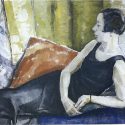Amelie Posse-Brázdová grew up in a Swedish upper-class milieu in Lund and became one of Sweden’s leading anti-Nazi activists during World War II. She studied music and art in Copenhagen from 1902 to 1904 and subsequently moved to Rome together with her husband, Professor Andreas Bjerre. During World War I, she was deported together with her second husband, the Czech nationalist and artist Oki Brazda, to Sardinia, which she describes in the first part of her ten-volume memoirs Den oförlikneliga fångenskapen.
In 1925 she moved with her husband to his home region in the newly formed state of Czechoslovakia, where they restored an old country estate. At the outbreak of World War II, she was forced to flee to Sweden, where she set up the Tirsdagsklubben (the Tuesday club), which played a leading role in refugee work and the anti-Nazi movement in Sweden. In Åtskilligt kan nu sägas of 1949, Amelie Posse provides a drastic and astonishing insight into the war years in neutral Sweden. She dedicated her writing to the memoir genre, and her books, which span the entire first half of the century, are unique in Swedish cultural and literary history.


